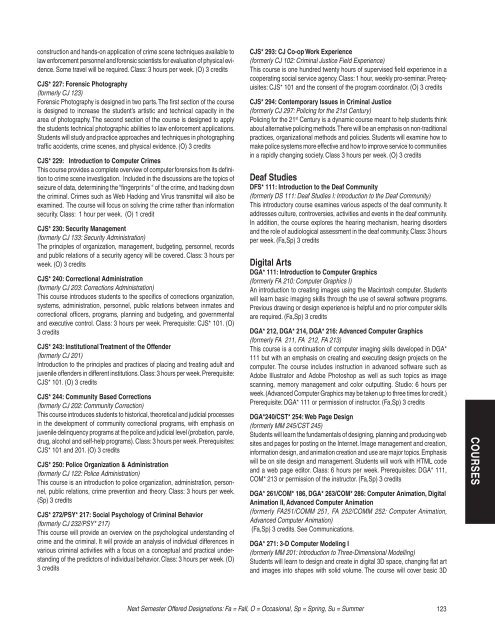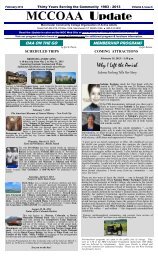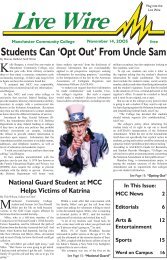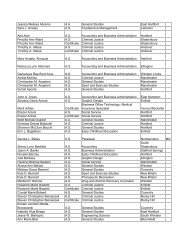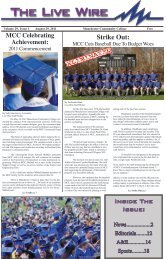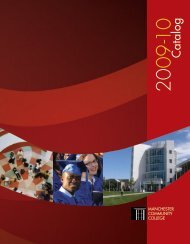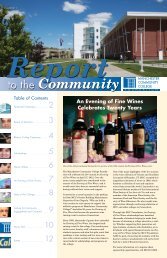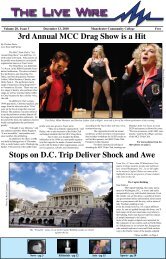Liberal Arts and Science - Manchester Community College ...
Liberal Arts and Science - Manchester Community College ...
Liberal Arts and Science - Manchester Community College ...
Create successful ePaper yourself
Turn your PDF publications into a flip-book with our unique Google optimized e-Paper software.
construction <strong>and</strong> h<strong>and</strong>s-on application of crime scene techniques available to<br />
law enforcement personnel <strong>and</strong> forensic scientists for evaluation of physical evidence.<br />
Some travel will be required. Class: 3 hours per week. (O) 3 credits<br />
CJS* 227: Forensic Photography<br />
(formerly CJ 123)<br />
Forensic Photography is designed in two parts. The first section of the course<br />
is designed to increase the student’s artistic <strong>and</strong> technical capacity in the<br />
area of photography. The second section of the course is designed to apply<br />
the students technical photographic abilities to law enforcement applications.<br />
Students will study <strong>and</strong> practice approaches <strong>and</strong> techniques in photographing<br />
traffic accidents, crime scenes, <strong>and</strong> physical evidence. (O) 3 credits<br />
CJS* 229: Introduction to Computer Crimes<br />
This course provides a complete overview of computer forensics from its definition<br />
to crime scene investigation. Included in the discussions are the topics of<br />
seizure of data, determining the “fingerprints “ of the crime, <strong>and</strong> tracking down<br />
the criminal. Crimes such as Web Hacking <strong>and</strong> Virus transmittal will also be<br />
examined. The course will focus on solving the crime rather than information<br />
security. Class: 1 hour per week. (O) 1 credit<br />
CJS* 230: Security Management<br />
(formerly CJ 133: Security Administration)<br />
The principles of organization, management, budgeting, personnel, records<br />
<strong>and</strong> public relations of a security agency will be covered. Class: 3 hours per<br />
week. (O) 3 credits<br />
CJS* 240: Correctional Administration<br />
(formerly CJ 203: Corrections Administration)<br />
This course introduces students to the specifics of corrections organization,<br />
systems, administration, personnel, public relations between inmates <strong>and</strong><br />
correctional officers, programs, planning <strong>and</strong> budgeting, <strong>and</strong> governmental<br />
<strong>and</strong> executive control. Class: 3 hours per week. Prerequisite: CJS* 101. (O)<br />
3 credits<br />
CJS* 243: Institutional Treatment of the Offender<br />
(formerly CJ 201)<br />
Introduction to the principles <strong>and</strong> practices of placing <strong>and</strong> treating adult <strong>and</strong><br />
juvenile offenders in different institutions. Class: 3 hours per week. Prerequisite:<br />
CJS* 101. (O) 3 credits<br />
CJS* 244: <strong>Community</strong> Based Corrections<br />
(formerly CJ 202: <strong>Community</strong> Correction)<br />
This course introduces students to historical, theoretical <strong>and</strong> judicial processes<br />
in the development of community correctional programs, with emphasis on<br />
juvenile delinquency programs at the police <strong>and</strong> judicial level (probation, parole,<br />
drug, alcohol <strong>and</strong> self-help programs). Class: 3 hours per week. Prerequisites:<br />
CJS* 101 <strong>and</strong> 201. (O) 3 credits<br />
CJS* 250: Police Organization & Administration<br />
(formerly CJ 122: Police Administration)<br />
This course is an introduction to police organization, administration, personnel,<br />
public relations, crime prevention <strong>and</strong> theory. Class: 3 hours per week.<br />
(Sp) 3 credits<br />
CJS* 272/PSY* 217: Social Psychology of Criminal Behavior<br />
(formerly CJ 232/PSY* 217)<br />
This course will provide an overview on the psychological underst<strong>and</strong>ing of<br />
crime <strong>and</strong> the criminal. It will provide an analysis of individual differences in<br />
various criminal activities with a focus on a conceptual <strong>and</strong> practical underst<strong>and</strong>ing<br />
of the predictors of individual behavior. Class: 3 hours per week. (O)<br />
3 credits<br />
CJS* 293: CJ Co-op Work Experience<br />
(formerly CJ 102: Criminal Justice Field Experience)<br />
This course is one hundred twenty hours of supervised field experience in a<br />
cooperating social service agency. Class: 1 hour, weekly pro-seminar. Prerequisites:<br />
CJS* 101 <strong>and</strong> the consent of the program coordinator. (O) 3 credits<br />
CJS* 294: Contemporary Issues in Criminal Justice<br />
(formerly CJ 297: Policing for the 21st Century)<br />
Policing for the 21 st Century is a dynamic course meant to help students think<br />
about alternative policing methods. There will be an emphasis on non-traditional<br />
practices, organizational methods <strong>and</strong> policies. Students will examine how to<br />
make police systems more effective <strong>and</strong> how to improve service to communities<br />
in a rapidly changing society. Class 3 hours per week. (O) 3 credits<br />
Deaf Studies<br />
DFS* 111: Introduction to the Deaf <strong>Community</strong><br />
(formerly DS 111: Deaf Studies I: Introduction to the Deaf <strong>Community</strong>)<br />
This introductory course examines various aspects of the deaf community. It<br />
addresses culture, controversies, activities <strong>and</strong> events in the deaf community.<br />
In addition, the course explores the hearing mechanism, hearing disorders<br />
<strong>and</strong> the role of audiological assessment in the deaf community. Class: 3 hours<br />
per week. (Fa,Sp) 3 credits<br />
Digital <strong>Arts</strong><br />
DGA* 111: Introduction to Computer Graphics<br />
(formerly FA 210: Computer Graphics I)<br />
An introduction to creating images using the Macintosh computer. Students<br />
will learn basic imaging skills through the use of several software programs.<br />
Previous drawing or design experience is helpful <strong>and</strong> no prior computer skills<br />
are required. (Fa,Sp) 3 credits<br />
DGA* 212, DGA* 214, DGA* 216: Advanced Computer Graphics<br />
(formerly FA 211, FA 212, FA 213)<br />
This course is a continuation of computer imaging skills developed in DGA*<br />
111 but with an emphasis on creating <strong>and</strong> executing design projects on the<br />
computer. The course includes instruction in advanced software such as<br />
Adobe Illustrator <strong>and</strong> Adobe Photoshop as well as such topics as image<br />
scanning, memory management <strong>and</strong> color outputting. Studio: 6 hours per<br />
week. (Advanced Computer Graphics may be taken up to three times for credit.)<br />
Prerequisite: DGA* 111 or permission of instructor. (Fa,Sp) 3 credits<br />
DGA*240/CST* 254: Web Page Design<br />
(formerly MM 245/CST 245)<br />
Students will learn the fundamentals of designing, planning <strong>and</strong> producing web<br />
sites <strong>and</strong> pages for posting on the Internet. Image management <strong>and</strong> creation,<br />
information design, <strong>and</strong> animation creation <strong>and</strong> use are major topics. Emphasis<br />
will be on site design <strong>and</strong> management. Students will work with HTML code<br />
<strong>and</strong> a web page editor. Class: 6 hours per week. Prerequisites: DGA* 111,<br />
COM* 213 or permission of the instructor. (Fa,Sp) 3 credits<br />
DGA* 261/COM* 186, DGA* 263/COM* 286: Computer Animation, Digital<br />
Animation II, Advanced Computer Animation<br />
(formerly FA251/COMM 251, FA 252/COMM 252: Computer Animation,<br />
Advanced Computer Animation)<br />
(Fa,Sp) 3 credits. See Communications.<br />
DGA* 271: 3-D Computer Modeling I<br />
(formerly MM 201: Introduction to Three-Dimensional Modelling)<br />
Students will learn to design <strong>and</strong> create in digital 3D space, changing flat art<br />
<strong>and</strong> images into shapes with solid volume. The course will cover basic 3D<br />
Next Semester Offered Designations: Fa = Fall, O = Occasional, Sp = Spring, Su = Summer 123<br />
COURSES


